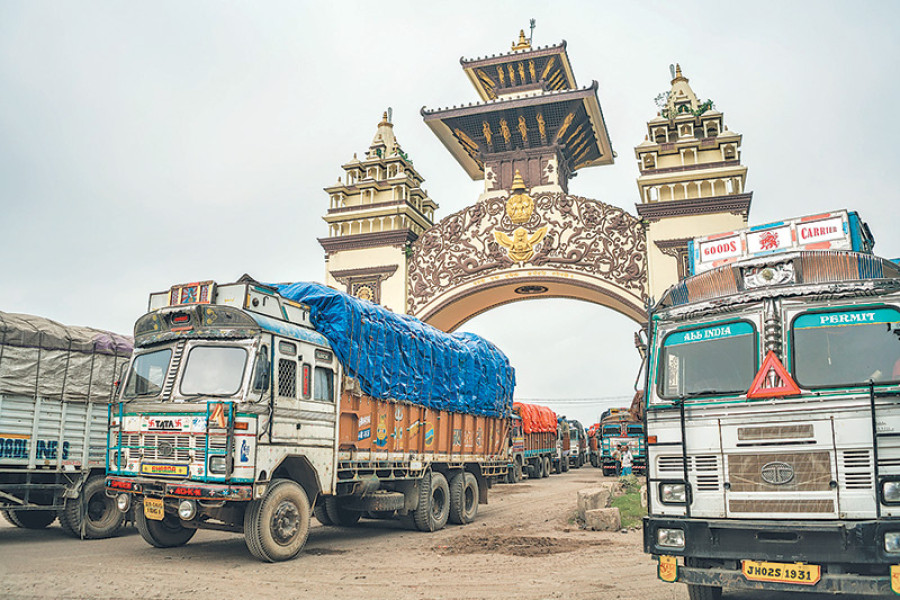Money
Nepali, Indian officials meet to discuss stalled clinker shipments
Nepali and Indian authorities will be meeting in Birgunj on Tuesday to find a temporary alternative to the transportation of clinker and fly ash to Nepal through the Raxaul border point after locals blocked shipments complaining about health hazards due to the bulk and dust.
Nepali and Indian authorities will be meeting in Birgunj on Tuesday to find a temporary alternative to the transportation of clinker and fly ash to Nepal through the Raxaul border point after locals blocked shipments complaining about health hazards due to the bulk and dust.
Raxaul locals have warned that they will shut down the border point from Monday, which could cripple a major portion of Nepal’s foreign trade.
Residents on the Indian side of Raxaul have been protesting that the transportation of clinker has created difficulties and congestion besides posing a health hazard from air pollution.
An Indian High Court has ordered Indian Railways to stop transporting goods that pose a risk to the health of locals in Raxaul. Indian Railways brings clinker and fly ash up required by the cement industry to the Nepal border.
Imports of clinker through Raxaul have come to a halt due to daily protests by locals, and around a dozen Nepali cement factories located on the Birgunj-Pathlaiya industrial corridor have been hit hard as their supply of the essential raw materials has been stopped. Over 80 percent of the clinker being used by these cement factories, which produce up to 1,050 tonnes of cement daily, comes from India.
Officials said that due to lack of a yard for dusty cargo, imports of such materials could be stopped in the future too. The dry port in Sirsiya also lacks a yard to unload dusty cargo.
Following the halt in shipments of clinker and fly ash through Raxaul, Nepali officials have taken up the matter with the Indian Embassy in Kathmandu, the Nepal Embassy in New Delhi and the Indian Ministry of Commerce.
“We are in close contact with Indian authorities to seek an alternative arrangement. They have proposed that clinker, fly ash and other dusty cargo be unloaded in Ramgadhwa, which is 15 km south of Raxaul.
So shipments through that border point, particularly of clinker and fly ash, have been disrupted,” said Ravi Shanker Sainju, joint secretary at the Ministry of Commerce.
Sainju is leading a Nepali delegation to Birgunj to hold talks with officials of Indian Railways to seek a temporary alternative to Raxaul.
Imports of clinker through Raxaul have been totally stopped from Saturday,
but Nepali companies have been importing small quantities through other border points. Raxaul is the only one border point between Nepal and India that allows passage of bulk and big cargo originating in third countries and India.
Nepal has already sent letters of exchange to India to allow the passage of big cargo through three other trading points too: Bhirahawa, Nepalgunj and Biratnagar.
The Nepali side is expected to sign the letters of exchange prior to the commerce secretary-level talks at the Inter-Governmental Committee (IGC) to discuss various trade, transit and commerce related issues.
“Nepali companies made a mistake by not informing us on time,” he said. “The second thing is that there is an agreement that clinker will be produced in Nepal and not be imported from India. But due to the easiness, they started importing clinker from India without informing us about it,” said Sainju.
“The transportation of clinker has created a massive pollution problem in the Raxaul area, and locals are upset due to the health hazards,” he added.
“Temporarily diverting shipments through Ramgadhwa may not provide a solution,” said another Nepali official, “so we have asked the Indian side to hand over the Integrated Check Post in Birgunj to us as soon as possible so that big cargoes and trucks can easily be cleared.
The Integrated Check
Post in Birgunj is not in operation due to some technical glitches, but officials hope that it can be operated within a couple of days. Senior Commerce Ministry officials held a meeting with office bearers of the Federation of Nepalese Chambers of Commerce and Industry on Sunday to seek their views on ending the impasse.
“First, our private sector did not bring the matter to our attention in time. Second, it will take long time to diversify trading routes for big cargos, and other alternatives are not ready yet,” said Sainju.




 9.83°C Kathmandu
9.83°C Kathmandu














